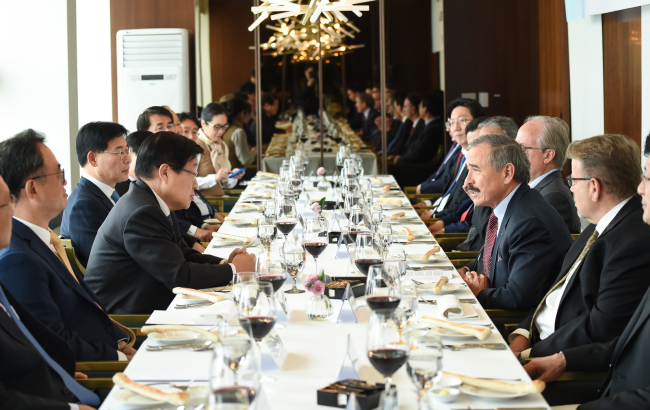KITA hosts meeting to boost trade between Korea, US
By Shin Ji-hyePublished : Nov. 19, 2018 - 17:14
The Korea International Trade Association hosted a meeting Monday between US Ambassador to South Korea Harry Harris and executives from major Korean conglomerates doing business in the US, in an effort to boost trade.

The meeting held in Seoul was attended by executives from Korean companies, including Samsung Electronics, Hyundai Motor, LG Electronics, Posco Daewoo, SK E&S and Hyosung. From the US embassy, deputy chief of mission, Rob Rapson, minister-counselor for commercial affairs, Gregory Briscoe, and minister-counselor for economic affairs, Pushpinder Dhillon, attended the meeting to listen to the difficulties raised by the Korean companies.
KITA CEO Kim Young-ju said, “The final revision of the KORUS free trade agreement in September was an opportunity (for the two nations) to take a step forward. We hope governments and businesspeople from the two sides can communicate on economic and trade issues through diverse channels in the future.”
Korea and the US officially announced in September they had reached an agreement in principle on the revision of their bilateral trade deal. The renegotiation of the deal started early this year after US President Donald Trump’s administration called for a revision in June last year on the grounds of the nation’s growing trade deficit with Korea.
At the closed-door meeting on Monday, the Korean side conveyed their business difficulties in the US market to the ambassador, and both sides highlighted the importance of future-oriented economic cooperation between the two nations.
Concerns have been growing among Korean companies as reports recently emerged that US President Trump is considering imposing new tariffs of up to 25 percent on imported vehicles and car parts under section 232 of the Trade Expansion Act.
Over the last month, four auto-related Korean companies, Hyundai Motor, Kia Motors, Hyundai Glovis and Hyundai Mobis, have all seen their shares tumble.
If 25 percent tariffs are imposed on Korean cars, losses from Korean exports to the US are expected to stand at around $66.1 billion, according to Choi Nam-seok, a professor at Chonbuk National University.
By Shin Ji-hye (shinjh@heraldcorp.com)








![[KH Explains] Hyundai's full hybrid edge to pay off amid slow transition to pure EVs](http://res.heraldm.com/phpwas/restmb_idxmake.php?idx=644&simg=/content/image/2024/04/18/20240418050645_0.jpg&u=20240419100350)







![[From the Scene] Monks, Buddhists hail return of remains of Buddhas](http://res.heraldm.com/phpwas/restmb_idxmake.php?idx=652&simg=/content/image/2024/04/19/20240419050617_0.jpg&u=20240419175937)

![[KH Explains] Hyundai's full hybrid edge to pay off amid slow transition to pure EVs](http://res.heraldm.com/phpwas/restmb_idxmake.php?idx=652&simg=/content/image/2024/04/18/20240418050645_0.jpg&u=20240419100350)

![[Today’s K-pop] Illit drops debut single remix](http://res.heraldm.com/phpwas/restmb_idxmake.php?idx=642&simg=/content/image/2024/04/19/20240419050612_0.jpg&u=)